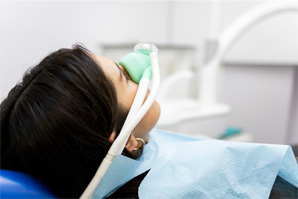Sedation Dentistry – San Antonio, TX
Relax Enough to Get the Care You Need
 Have you ever put off important dental work because of anxiety or fear? If you have, you’re not alone. It’s estimated that up to 20 percent of American adults have done the exact same thing. However, you no longer have to be scared of the dentist, thanks to Dr. Kadamani and her sedation dentistry in San Antonio. With a combination of local anesthetic and a special sedative, you can relax enough to get the care you need. As a result, you can look forward to a more comfortable and worry-free treatment. If you have found yourself putting off needed dental work due to anxiety, contact us today to learn more about how we can help you.
Have you ever put off important dental work because of anxiety or fear? If you have, you’re not alone. It’s estimated that up to 20 percent of American adults have done the exact same thing. However, you no longer have to be scared of the dentist, thanks to Dr. Kadamani and her sedation dentistry in San Antonio. With a combination of local anesthetic and a special sedative, you can relax enough to get the care you need. As a result, you can look forward to a more comfortable and worry-free treatment. If you have found yourself putting off needed dental work due to anxiety, contact us today to learn more about how we can help you.
Nitrous Oxide Sedation

Nitrous oxide is commonly referred to by its nickname: laughing gas. The most mild form of sedation dentistry, it’s safe for patients of all ages and is effective at alleviating anxiety, stress, and nerves in the treatment chair. If you are interested in adding it to your treatment plan, then get in touch with us so we can determine if you’re a candidate. In the meantime, you can read on to learn more!
Why You Shouldn’t Avoid the Dentist
 Just because fear and anxiety surrounding dental visits are common, doesn’t mean it’s good for you. In fact, it can be severely detrimental to your oral and even your overall health. Problems that seem minor at first, like cavities and gingivitis, can quickly turn into larger issues, like oral infections that can spread, if you don’t seek treatment. While getting a simple filling for a cavity is not such a big deal, putting it off might mean that in the future you have to get a root canal or even a tooth extraction. That’s why you shouldn’t avoid seeing your dentist for treatment, especially if they offer sedation.
Just because fear and anxiety surrounding dental visits are common, doesn’t mean it’s good for you. In fact, it can be severely detrimental to your oral and even your overall health. Problems that seem minor at first, like cavities and gingivitis, can quickly turn into larger issues, like oral infections that can spread, if you don’t seek treatment. While getting a simple filling for a cavity is not such a big deal, putting it off might mean that in the future you have to get a root canal or even a tooth extraction. That’s why you shouldn’t avoid seeing your dentist for treatment, especially if they offer sedation.
Sedation Dentistry FAQs
Is sedation dentistry safe?
Yes – the FDA considers sedation dentistry to be safe and effective. Nitrous oxide in particular is the safest dental sedation option for the most amount of people.
That said, there are certain situations where nitrous oxide might not be the best option. Patients with upper respiratory issues, for example, might experience complications with the gas. Nitrous oxide is also generally not recommended for women who are pregnant. Rest assured, your sedation dentist in San Antonio will thoroughly review your health history to make sure you’re safe during your treatment!
What are the aftereffects of sedation dentistry?
Children with sensitive stomachs may feel a little nauseous after their dental treatment with nitrous oxide sedation. The vast majority of patients, however, experience very little, if any, side effects. That’s part of the beauty of nitrous oxide – it acts quickly, leaves the system promptly, and doesn’t make patients feel groggy or drowsy for the rest of the day. In all likelihood, you’ll be able to go about your normal routine within minutes of completing your treatment.
Is sedation dentistry covered by insurance?
Most of the time, no. Dental insurance plans typically label sedation as a “luxury,” and don’t offer coverage because it’s not strictly medically necessary. Now, if you do have a physical or mental disability that makes it extremely difficult to receive dental care without sedation, your plan may consider it necessary and cover at least part of the costs. You may also be eligible for sedation dentistry benefits if your treatment is more complex.
Our knowledgeable team will be sure to review your dental insurance benefits and let you know how much coverage you can expect.
Does dental sedation make you tell secrets?
No, nitrous oxide isn’t anything like a “truth serum”! True, you may feel light, floaty, or euphoric, but you likely won’t feel compelled to say anything you normally wouldn’t. Even if you do say something you’d rather be kept a secret, rest assured, we’ll keep that information in the confines of the treatment room! As health care providers, we take patient confidentiality very seriously and won’t divulge that sort of thing.
Nitrous oxide also won’t make you laugh like a hyena. Despite having the nickname of “laughing gas,” nitrous oxide is very unlikely to result in big bursts of cackling. At most, you might giggle more easily than normal.










